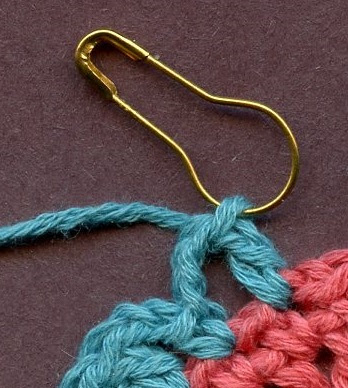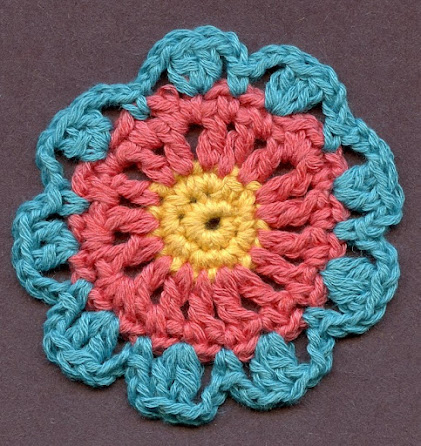On a predetermined course the needle journeys through the net, Over and under, around and back, over and over again (the under yet to come) A slender Silver Mouse in a Maze
Saturday, September 9, 2023
Tuesday, September 5, 2023
"A picture is worth . . ."
Coming up next ~
I am creating a template for you to copy and paste. You can use it to understand the geometry of crochet and perhaps chart your own patterns.
The only software you need is the "Graph Paper Printer" by Dr. Philippe Marquis. It is free.
That software will get you paper to draw on, free hand. I use the polar grid, and sheet music paper.
If you want to use computer-assisted drawing programs, I use Affinity. It is less expensive and easier to use than Adobe Illustrator.
Wednesday, August 23, 2023
Lemonade !
The Fashion Show
Before I started this series of posts I took a lesson, or two, from
Jane Snedden Peever,
https://www.jspcreate.com
"They" say a good teacher is one who inspires.
The above circles are wine cozies. I drink wine, with ice. The condensation
on the stemware glass - even the plastic ones - would drip on my clothing.
And since I was already playing with crochet, I solved my problem by
making wine cozies.
The thing about a TBI is, you think you can do things,
and discover that skill is gone . . .
So you have to figure out a way to make your ideas work.
Anyone can do anything with mindful effort,
and a willingness to keep at it.
Never feel sorry for a 'disabled' person.
Instead, rejoice with them in their accomplishments,
However small, in your world.
In their world, it is HUGE!
So this post is about mistakes. . .
and how to live with them.
If mistakes are not 'your thing' - skip this and go directly to the previous post.
While practicing making centers, I made this. But,
I need one more SC to make a center that can be
divided by 4.
In the next row, "SC2 in ea. st."
I must make 3 additional stitches:
1 for this row
and 2 for the next row.
I learned that by trial and Error!!
It started ok, but in the orange row, I have 17 DCs.
So, using the same color, I added what I thought would be
the correct number of stitches.
Wrong again!
While it will never be a square,
I can use it as a circle.
Monday, August 21, 2023
Start row with a Double Crochet
When can you use a DC without a CH3 beginning? At the start
of the row with a new color.
You
cannot use it to start a row within a ‘magic ring’ –
but you can make a magic ring, do a row of SC then start the
next row with
DCwoCH3 = Double crochet without
chain 3.
Do NOT make a slip stitch.
double crochet.
Note: the hook is held
vertical for clarity,
but make the stitch with
the hook at right angles
to the work.
Work the round as you normally would,
but do not count the first long loop
as a stitch.
At the end of the row, work the first
double crochet
(Or DC+CH1) as the last stitch.
Put a stitch holder in the last stitch
made (black pin) and one
at the top of the first DC (brass pin).
Pull out the loose end of the loop
until all that remains is the DC.
Join with an invisible join.
Completed pattern row.
With deep appreciation to Jane at JSP Creates.
Next up:
Lagniappe
Pronounced Lan-yap
Meaning
Bonus Material
Sunday, August 20, 2023
Crochet Olé
Lay the groundwork for a pattern:
I want my polygon to have 4 sides,
but I like each side to have an odd number of stitches:
start, center, and end.
I will start with a ‘magic circle’ and SC5.
I put a pin in
the last SC made.
Instead of a join, my circle is small, so I choose to make a
spiral instead of a join, continuing the spiral until there are 10 stitches to
my circle.
I could have started with 10 stitches
in the ‘magic ring’,
but it squeezes up better with only
5.
This is where the pin marking
the end of the first row is important.
I could start my square with only 5 stitches in between the
corner but that looks a little cramped.
I decided that 10 stitches give me more to play with, for a
total of 44* stitches. That leaves 11 stitches on each side. Now I can make up a
pattern of 11 stitches.
This is my center. It
should count 10 single crochets.
I use a black pin to
mark last stitch and gold for first stitch. Or vice versa.
Be consistent and
you won’t have to remember. It will become habit.
Row 2: SC2 in each stitch. 20 total.
At this point, I need 24 more stitches. I could keep
increasing by 10, then 4. Will an increase of 4 stitches keep my piece flat? Two
more rows of stitches will begin to make my piece too large to have any kind of
creative stitch pattern and still keep it under 4 inches.
Row 3: *SC2 in each stitch x 9, 3 SC in next st. *Repeat to
end. 44 stitches.
If I want
4 sides, but an odd number on each side, I must have a base of a multiple of 4
plus 1, or in this case (4 sides) a multiple of 4 plus 4.
44/4=11
Correction!
Do not count the corners! So I needed 40 stitches.
Each side has a corner and 9 pattern stitches.
The Bonus Material in which I illustrate mistakes
will appear after the Double Crochet
without a Chain 3 in Part 3 of 3.
However, you want a straight side.
That means the increases come in the corners.
How did I know I wanted to make a
spiral instead of a join? A ‘magic ring’
instead of chains?
I made five centers and chose the one I liked
best.
Yes, it is that easy.
Keep it under 20 (fingers and toes)
and math is easy too.
At the end of Row 2, I had 30 stitches. 30 cannot be divided by 4 and come
out even.
30/4 = 7 + 2/4
If I want 7 sections I must subtract 2, and if I want 8 sections I must
add 2.
Hmmm – does that work with, for
example, 15/7 ? 15/7 = 2 + 1/7
Can I add 1 to 15 and get something
that will divide by 7 ?
NOPE! But if I increase by 1 stitch,
I can divide by 4 !
So, what else works?
15 minus 1 = 14, which can be
divided evenly. If I want to divide 15 evenly by 4,
I must add 1 or 5 (which is the sum
of 4 plus 1)
This proves the point, you don’t have to find your way out of a maze to solve a problem.
Another option is to start with a multiple of
4, and when I reach a pattern row, increase by 1 + plus the increases needed to
go around the block.
Why does something ‘work’ with knitting or crochet that won’t
work with a woven piece?
Look at your yarn. It is one strand of yarn (most times). Now look at your stitch.
It makes a loop. That loop comes out, goes around and goes back down. That makes 3 layers of one strand. That loop means that your finished piece will stretch or compact. Knitting is stretchier than crochet. It is the nature of the beast. When we want to make
a stretchy fabric out of woven material, we over-spin the yarn, and that makes it crinkle up. We call the fabric ‘crepe.’ Think of a ruffled crepe myrtle bloom or skin with many lines: There are hills and valleys in that skin. It has lost its stretch, but the skin is still there.
We are almost to the most interesting part.
But first, I need to know how many stitches to increase
in each row to keep my circle/square flat.
Let’s look at the classic Granny Square:
Row 1: Set up of ring and work CH3, DC2, CH3, *DC3, CH3. *to end.
12 stitches and 4 ‘chain-3-spaces’. Join
Row 2: CH3, DC2, CH2, DC3, CH3, *DC3, CH2, DC3, CH3. *to end. Join.
.At this point it isn't necessary to count stitches.
If the pattern is 'off' you will see it.
Next up . . .
The DC Row without Chain 3 to start !
Friday, August 18, 2023
Crochet, Old and New
Everyone has that special teacher. Mine is Jane at JSP Creates.
Review:
This is for people who already have a working knowledge of crochet but may need some review.
Make one stitch on either side of each stitch,
*which may be a ‘chain stitch space’.
The top of a stitch lies between stitches.
If you have a row of DC+ch1, there will be 2 stitches in each space. This means that for each DC+ch1 (2 stitches) you now have 3 stitches: the DC of the previous row, plus 2 stitches (one on either side).
Note that the first tan DC is created with
1 long chain
instead of a ch3.
In the gray row, can you find the ch3
that normally starts a DC row?
(You won’t find it because it isn’t
there.)
Striped circles are great for learning the basics, but in
time I need more of a challenge. To add variety to your piece:
1. Combine stitches with spaces.
2. Use a variety of stitches. Be aware that
different stitches will have different heights.
a.
A slip stitch adds no height nor width (in
theory).
b.
A chain stitch adds little height, but some
width.
c.
A single crochet adds a little more height and
width.
d.
A double crochet adds more height, not more
width.
e.
A triple crochet adds yet more height, not more
width.
f.
A multiple of double crochet in one space adds
width, not more height than a single double crochet.
g.
A cluster of double crochet can add height and
width but covers the area of one stitch at the top and bottom.
3.
Combine items #1 and #2 to create a ‘pattern.’ A 'stitch, ch 3, stitch' in a single stitch or space will create a corner, changing the
circle into a polygon.
By starting with a small circle (that will become a 3” or 4”
square) you can resort to ‘trial and error.’ If you don’t like the look of what
you just did, it is easy to rip out and try something else.
“Start with the
End in Mind”
One of Stephen Covey’s
7 Habits of Effective People
“Every step you take,
every stitch you make” – no one is watching you. Do what pleases you.
A bad start almost never ends well .
. .
The key here is "almost" .
To be continued.
Post Script:
Something to remember when learning a new technique: focus
on one thing at a time. The first time you work it, the quality of the
stitches may be wonky. That’s OK. Designers don’t publish first drafts. Tackle
only one thing at a time. A photographer may take 1,000 photos to get that one ‘great
shot’.
With that in
mind, be aware that I am recovering and re-learning after a traumatic brain
injury. Before the incident, eight years ago, I was a professional designer/writer
and illustrator. As a freelancer, I had to learn many different disciplines. Retired now, I provide this information for free and hope it is shared. There are mistakes in my work - I do that to see who is paying attention. (I wish). Actually, I love mistakes. We learn more from our mistakes than we do from our successes.
If my work
doesn’t look as wonderful as that of designers who are publishing patterns, it
may be because this is a journal, of a journey to recovery. I don’t work
on any one discipline long enough to develop mastery. There may be months
between posts. It happens that way.
Thursday, June 22, 2023
Counted Thread Embroidery on a Journey to Crochet
I am skipping over the several months of counted thread embroidery to adventures in crochet. More to follow.
In the following posts, I combine the counted thread embroidery with crochet on linen - it is certainly a counted thread technique - worked on a ground that is not so much counted, except as counted by the ruler.
Meanwhile - watch this space. More to come.


















